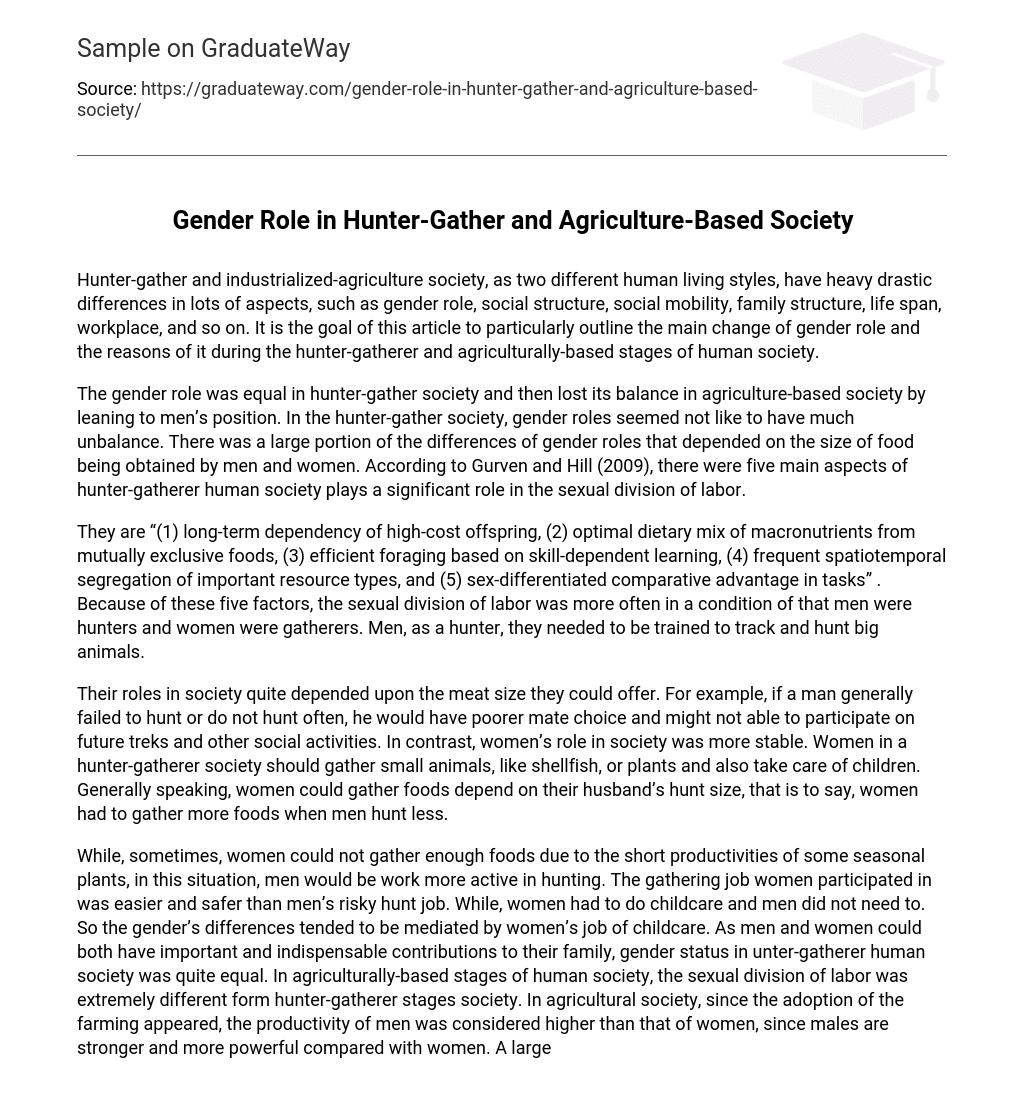Hunter-gather and industrialized-agriculture society, as two different human living styles, have heavy drastic differences in lots of aspects, such as gender role, social structure, social mobility, family structure, life span, workplace, and so on. It is the goal of this article to particularly outline the main change of gender role and the reasons of it during the hunter-gatherer and agriculturally-based stages of human society.
The gender role was equal in hunter-gather society and then lost its balance in agriculture-based society by leaning to men’s position. In the hunter-gather society, gender roles seemed not like to have much unbalance. There was a large portion of the differences of gender roles that depended on the size of food being obtained by men and women. According to Gurven and Hill (2009), there were five main aspects of hunter-gatherer human society plays a significant role in the sexual division of labor.
They are “(1) long-term dependency of high-cost offspring, (2) optimal dietary mix of macronutrients from mutually exclusive foods, (3) efficient foraging based on skill-dependent learning, (4) frequent spatiotemporal segregation of important resource types, and (5) sex-differentiated comparative advantage in tasks” . Because of these five factors, the sexual division of labor was more often in a condition of that men were hunters and women were gatherers. Men, as a hunter, they needed to be trained to track and hunt big animals.
Their roles in society quite depended upon the meat size they could offer. For example, if a man generally failed to hunt or do not hunt often, he would have poorer mate choice and might not able to participate on future treks and other social activities. In contrast, women’s role in society was more stable. Women in a hunter-gatherer society should gather small animals, like shellfish, or plants and also take care of children. Generally speaking, women could gather foods depend on their husband’s hunt size, that is to say, women had to gather more foods when men hunt less.
While, sometimes, women could not gather enough foods due to the short productivities of some seasonal plants, in this situation, men would be work more active in hunting. The gathering job women participated in was easier and safer than men’s risky hunt job. While, women had to do childcare and men did not need to. So the gender’s differences tended to be mediated by women’s job of childcare. As men and women could both have important and indispensable contributions to their family, gender status in unter-gatherer human society was quite equal. In agriculturally-based stages of human society, the sexual division of labor was extremely different form hunter-gatherer stages society. In agricultural society, since the adoption of the farming appeared, the productivity of men was considered higher than that of women, since males are stronger and more powerful compared with women. A large number of female labors, in this situation, were removed from the primary production workplace.
In addition, according to Bolger, “the emergence of the secondary products revolution, which involved the exploitation of domestic animals for wool, milk, traction, and transport … is widely considered to have lowered female status by further separating male and female labor and restricting women’s work to the domestic sphere. ” Due to these two factors—farming and domestic animals—women tended to be confined to inside the home, caring for children and housekeeping. As a consequence of change of sexual division of labor, the gender role changed.
In agricultural society, women’s role was declined because they were barred from agricultural work. On the other hand, males’ role was more likely to be increased. Male needed to work outside of home, as a farmer, supporting a family’s main food supply. In this way, men were considered as the “bread winner” of the family and women as “home makers”. As a result, the gender role leaned towards men’s position and female status became lowed. Overall, there was a large difference of gender’s role in hunter-gatherer and agriculturally-based human society.
In hunter-gather society, gender role was in a balance status. Women’s role was relatively equal to men’s role. While in agriculturally-based human society, gender role became unbalanced because of the appearance of farming and domestic animals. The different gender role between women and men was attributable to productivity differences. Thus, women who occupied less primary production works tended to have lower status in society than men. Therefore, the gender roles were most likely to incline to men’s position on agriculturally-based society.





